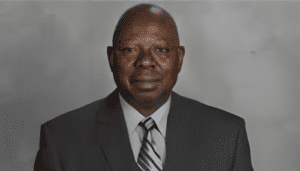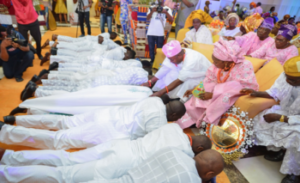
Traditional Institution: A representative of our ancestral spirits, the good, the bad
By Jeleel Olawale
The history of traditional rulership in Nigeria predates the nation’s colonial era, forming one of the very cores of governance and administration. Traditional institutions, perhaps being the oldest institution in Nigeria, is deeply rooted in the culture, history and traditions of various ethnic and cultural backgrounds.
To ordinary people, they see the traditional ruler as the custodian of the traditions, history and customs of an ethnic group of individuals, and who is appointed by such individuals to rule, govern and administer justice in line with the laid down customs and traditions of the people.
A traditional ruler has also been defined as a person who by virtue of his ancestral position occupies the throne or stool of an area and who has been appointed to it in accordance with the customs and traditions of the area and whose throne has been in existence before the advent of the British in Nigeria.
A traditional ruler is a person who, by reason of inheritance or lineage has been appointed to a chieftaincy position by those entitled to do so under customary law and whose appointment has been approved by the approving authorities.
In Yorubaland, a traditional ruler is regarded as a replica of god, by virtue of which all their words become law, the infraction of which often times attract corporeal and sometimes, capital punishments.
Various courts pronouncements have described traditional position as a position of honour, primacy among a particular section of the native community which is guided by the principle of legitimacy, stemming from the customs and tradition of the people.
However, traditional rulers occupied important positions among the people of Nigeria. Their positions are legitimised by the traditions, history and culture of their respective peoples who hold them in high esteem and reverence.
Traditional rulers also cater for the economic, social and political aspirations of their people, and today they have become part of individual cultural heritage. They occupy communal political leadership positions sanctified by cultural, moral and values and enjoying the legitimacy of particular community to direct their affairs.
Traditional institutions constitute a body of polity and administration that are respected by the people of such community through their respect for cultural heritage and the historical antecedent of the land.
The Ooni of Ife, Oba Enitan Adeyeye Ogunwusi in one of his addresses, advocated for constitutional responsibilities that are developmental for traditional rulers in Nigeria, stressing that traditional rulers are closer to the people than government.
Oba Ogunwusi, said people first come to traditional rulers when problem arises, adding that they should be honoured and accorded roles to encourage peaceful coexistence.
“For developments that are genuine and people-oriented, the National Assembly should evolve constitutional responsibilities that are development oriented for our traditional rulers so that everybody will have a taste of the government.
“This will be far more effective because our traditional rulers are closer to the people than the government. If we focus on matters that are common to us, with this in our subconscious nature, we will know that we are one and from one God,” Ooni declared.
Oba Ogunwusi promised to do everything within his power to sustain the cultural heritage and traditional history of the Yorubaland. Traditional rulers are the custodians of culture.
The permanent Chairman of Osun Council of Obas had in different occasions appealed to the people of Yoruba land to be proud of their culture wherever they are living and not to allow civilisation and western way of life to erode the rich culture they inherited from their forefathers.
“Africans should embrace their cultural heritage as a tool for development.The promotion of culture encourages unity which is important for development in all aspects of life. I am unhappy that despite the diversity of the Nigerian culture, the government is not doing enough to explore the opportunities inherent in the development of culture and heritage.
“There is no nation that will grow without culture and heritage, go and find out; all developed nations in the world decided to put their heritage, culture and tradition as number one. But we have jettisoned our heritage and culture. Both of them are stronger than religion, they should be number one.
“We have a very diverse culture in Nigeria and common ancestral roots as Africans. Our culture is the only way forward for growth and development. It is unfortunate, the government is not paying attention to it as they used to.
“The largest gathering of the entire black race happened in 1977 in Nigeria; that’s over 40 years ago. The way forward for the entire black race is to continue to uphold our culture and heritage and that is what we are doing in Ife land, we are very proud of it. Our faith still stands and nothing can shake it but our culture must be allowed to thrive”, Ooni said.
Culture is synonymous with traditional institutions which they have always been advocating in all fora. But governments have not been doing well in giving appropriate recognition to traditional rulers to take their proper place in the art of governance.
They are not being recognised in matter of politics and at times disrespected by politicians.They become tools in the hands of politicians to settle political disputes and later dumped.
Oba Jacob G. Buba, Gbong Gwom of Jos, believed that the marginalization of traditional rulers is one of the major reasons the nation’s peace continues to be threatened. The traditional leaders in Nigeria have been marginalized in the struggle for national peace.
He said a lot of challenges faced within the country today, are a manifestation of the neglect of the roles that traditional rulers play and a conscious attempt at forgetting history. There has always been a structure that saw traditional rulers and political leaders play their parts effectively for the progress of the nation, an arrangement which he noted has now been disregarded.
Buba called for an urgent need for Nigerians to reconnect with their roots, and build the nation again from the home-front to the community and down to the country at large, adding that “we must do away with divisive cultures.”
Contrary to the role traditional rulers play in nation building, Nosa Igbinadolor, believed that traditional institutions in Nigeria have never been profit centres that significantly add to the social, economic and reputational bottom line of the country. On the contrary, they are heavy cost centres chalking up about 5 per cent of local government revenues with no discernible level of effort.
He opined that apart from propitiating the gods and ancestors, there is nothing useful that can be attributed to the work of traditional institutions that cannot be done outside them. The people are capable of mobilising themselves as has been proved by political and social mobilisations across the country with no input from traditional rulers and, after all, traditions which are dynamic are owned and guarded by the people and not the rulers.
“Unlike independent India’s nascent rulers, Nigeria’s post-independence political leaders never made any effort to build a Pan-Nigerian consensus and a Pan-Nigerian identity. They were too beholden to their nativist power structure, guarded and guided by the elemental influences of primeval traditional institutions and rulers.
“In the background were always the traditional rulers whispering the need to protect the political leaders’ heritages.”
The traditional rulers had their own fair share as they were being accorded respect and take their proper place.
Government should as a matter of fact give the traditional rulers their normal place in democratic governance to play their roles appropriately.



